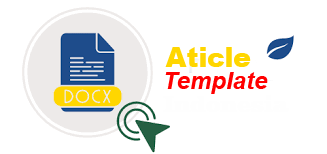Meningkatkan Kognitif Siswa SMAN I Jambi Melalui Modul Berbasis E-Book Kvisoft Flipbook Maker
DOI:
https://doi.org/10.30865/json.v1i1.1397Abstract
This research was aimed to: produce module based on e-book using Kvisoft Flipbook Maker application that proper to increase learning interest and cognitive learning outcome, know the increasing interest of senior high school students which use learning media module based on e-book using Kvisoft Flipbook Maker application, and know the increasing of cognitive learning outcome of senior high school students which use learning media module based on e-book using Kvisoft Flipbook Maker application. The result show that: the module based on e-book using Kvisoft Flipbook Maker application is proper to increase learning interest and cognitive learning outcome of senior high school students seen from very good and good results category of practitioner appraisal and student’s response, the increasing of student’s learning interest which use module based on e-book using Kvisoft Flipbook Maker application by low category standard gain, and the increasing of student’s cognitive learning outcome which use module based on e-book using Kvisoft Flipbook Maker application by medium category standard gainReferences
Mundilarto, (2010), Penilaian Hasil Belajar Fisika. Yogyakarta: Universitas Negeri Yogjakarta Press..
Suprono, Andreas, (2012), Pengaruh Penggunaan Multimedia Interaktif terhadap Prestasi dan Minat Belajar Fisika di SMA Santa Maria Yogyakarta.
Hake, Richard R, (2002), Relationship of individual student normalized gains in mechanics with gender, high-school physics, and pretest scores on mathematics and spatial visualization. Makalah disajikan dalam Physics Education Research Conference, Boise, Idaho.
Ratnawulan, Elis dan Rusdiana, (2015), Evaluasi Pembelajaran. Bandung: Pustaka Setia
Marthen Kanginan, (2017) Fisika untuk SMA/MA kelas X. Jakarta: Erlangga.
Eko Suyanto & Sartinem, (2009), Pengembangan Contoh Lembar Kerja Fisika Siswa dengan Latar Penuntasan Bekal Awal Ajar Tugas Studi Pustaka dan Keterampilan Proses untuk SMA Negeri 3 Bandar Lampung. Prosiding Seminar Nasional Pendidikan
Paul Suparno, (2015), Metodologi Pembelajaran Fisika. Yogyakarta : Universitas Sanata Dharma.
Arief S Sadiman, dkk, (2016), Konstruksi tes: Kemampuan Kognitif. Yogyakarta: Pustaka Pelajar
Sugiyono, (2015), Metode Penelitian Pendidikan: Pendekatan Kuantitatif, Kualitatif, dan R&D. Bandung: Alfabeta.
Andi Prastowo, (2013), Panduan Kreatif Membuat Bahan Ajar Inovatif: Menciptakan Metode Pembelajaran yang Menarik dan Menyenangkan. Yogyakarta: Diva Press,.
Azwar, (2017), Reliabilitas dan validitas (Edisi 4). Yogyakarta: Pustaka Pelajar. Fisika FMIPA Universitas Negeri Yogjakarta kerjasama JICA.
Aiken, Lewis R. (1980). Content validity and reliability of single items or questionnaires. Educational and Psychological Measurement.
Serway, Raymond A & Jewett, John W, Jr, (2010), Physics for Scientists and Engineers. Belmont: Brooks/Cole.
Hamalik, Oemar. (2011). Kurikulum dan Pembelajaran. Jakarta: Sinar Grafika. Haryadi Sarjono & Winda Juliaita, SPSS vs LISREL. Jakarta: Salemba Empat..
Jamil Suprihatiningrum, Strategi Pembelajaran.DIY: Ar-ruzz Media. Kemendikbud. (2014). Permendikbud Nomor 59 Tahun 2014 Tentang Kurikulum 2013 Jakarta: Kemendikbud Juli 2016.
Downloads
Published
How to Cite
Issue
Section
License

This work is licensed under a Creative Commons Attribution 4.0 International License
Authors who publish with this journal agree to the following terms:
- Authors retain copyright and grant the journal right of first publication with the work simultaneously licensed under Creative Commons Attribution 4.0 International License that allows others to share the work with an acknowledgment of the work's authorship and initial publication in this journal.
- Authors are able to enter into separate, additional contractual arrangements for the non-exclusive distribution of the journal's published version of the work (e.g., post it to an institutional repository or publish it in a book), with an acknowledgment of its initial publication in this journal.
- Authors are permitted and encouraged to post their work online (e.g., in institutional repositories or on their website) prior to and during the submission process, as it can lead to productive exchanges, as well as earlier and greater citation of published work (Refer to The Effect of Open Access).




